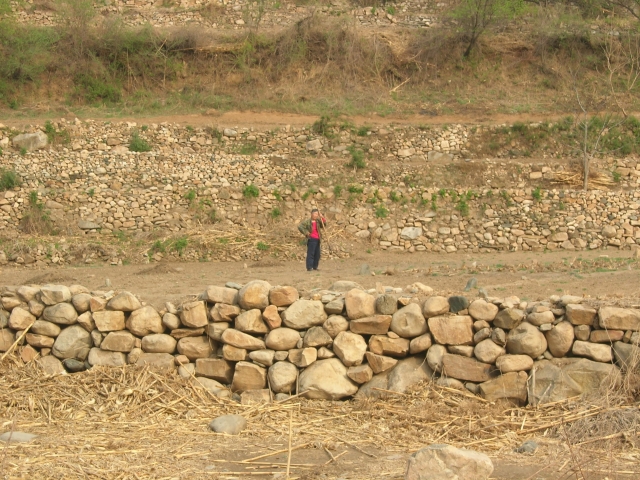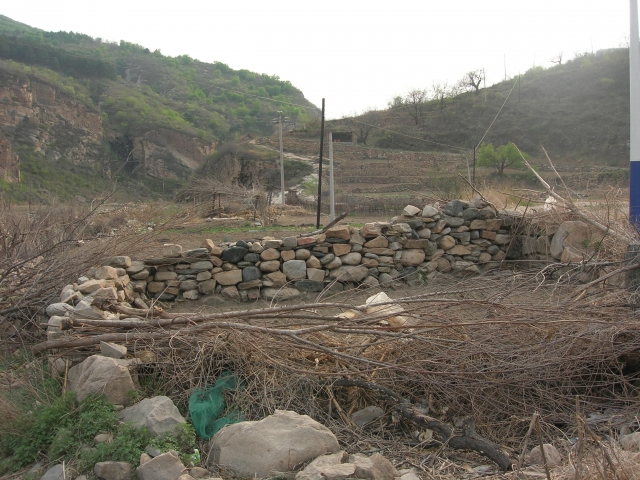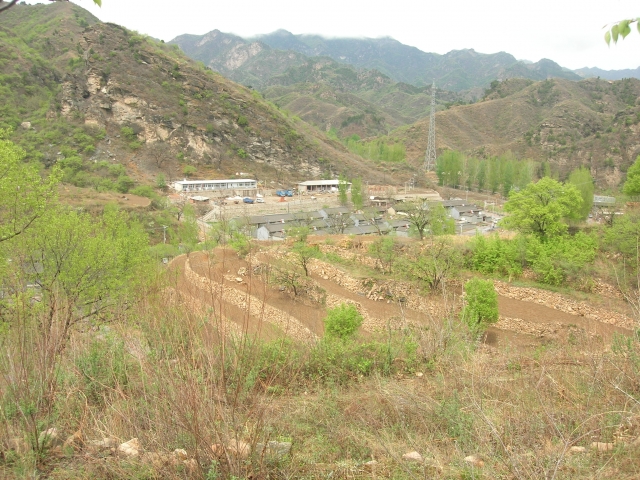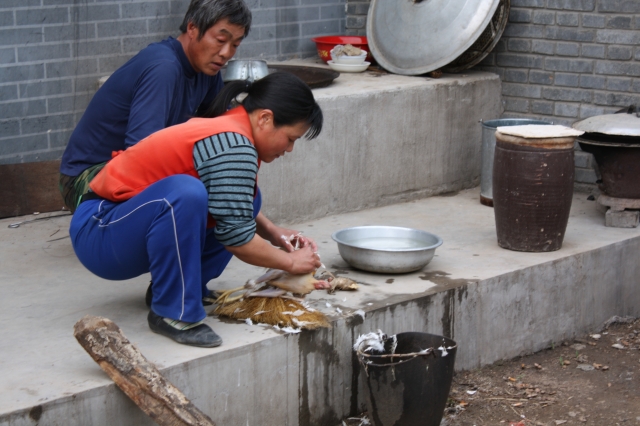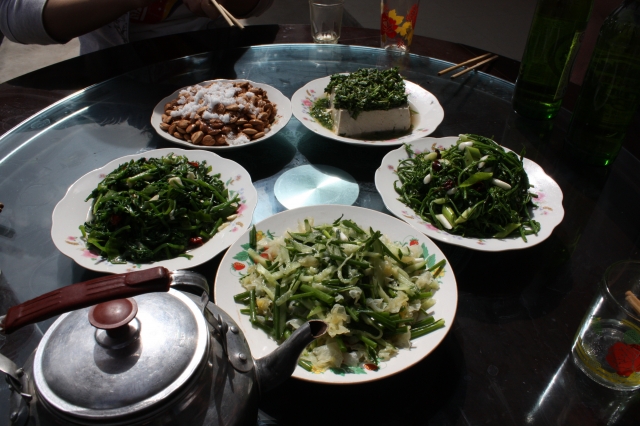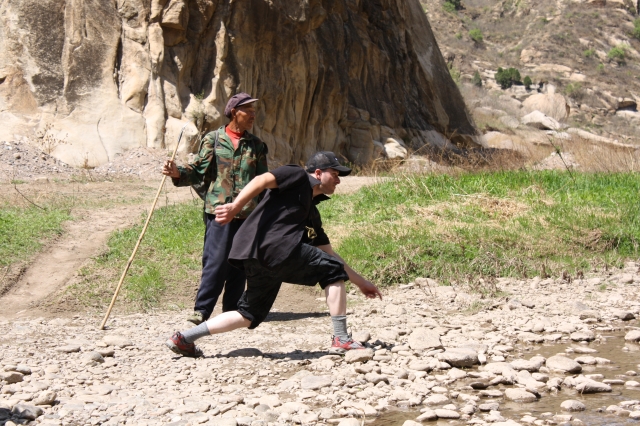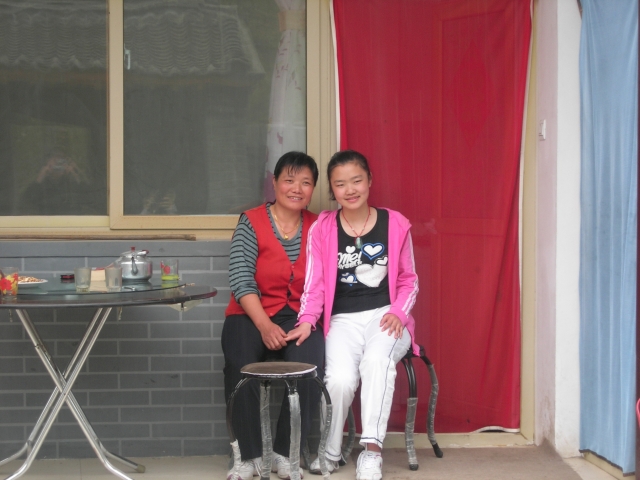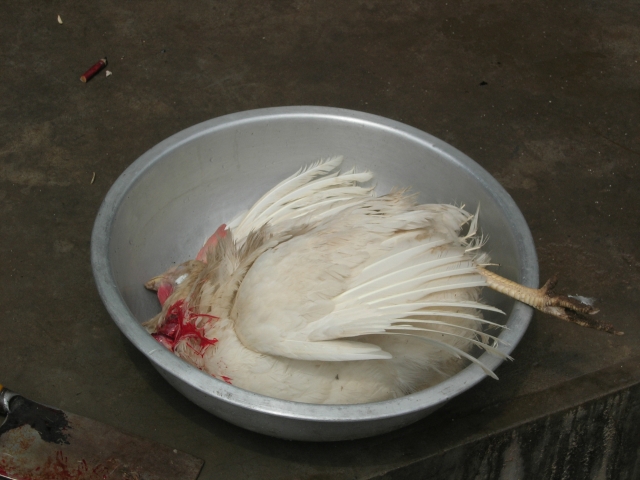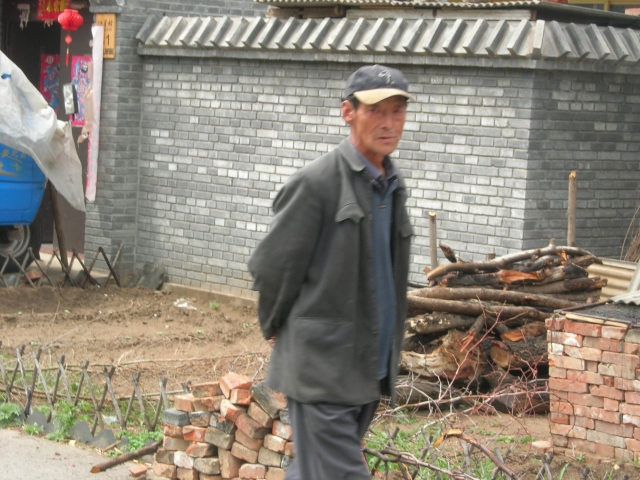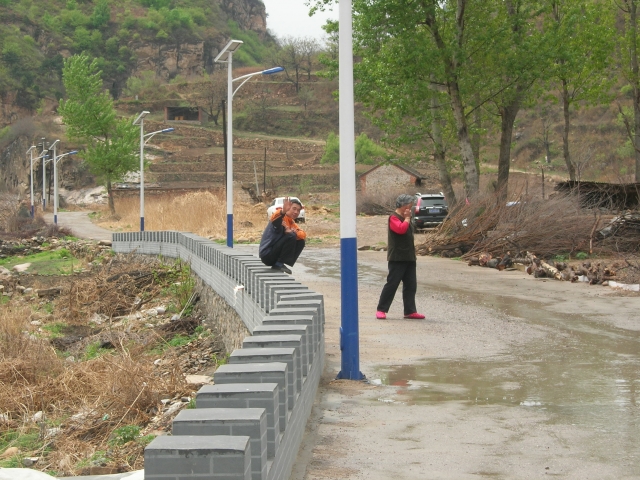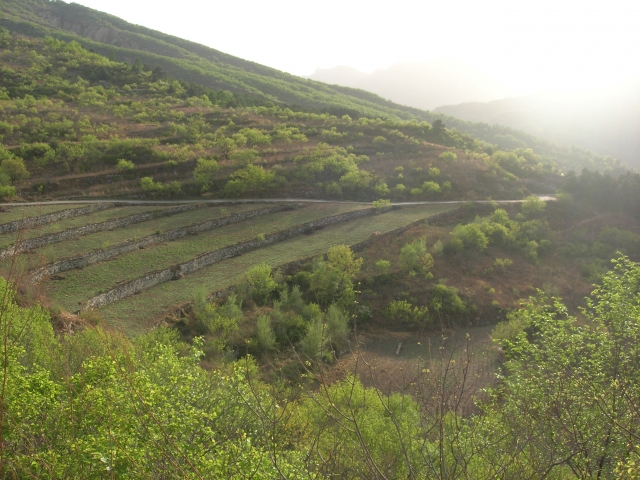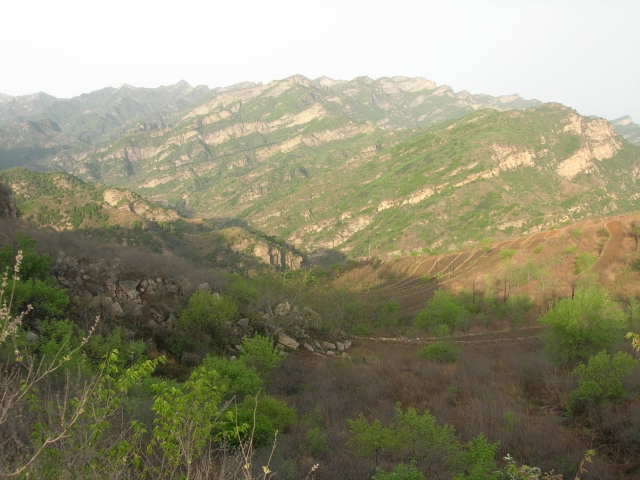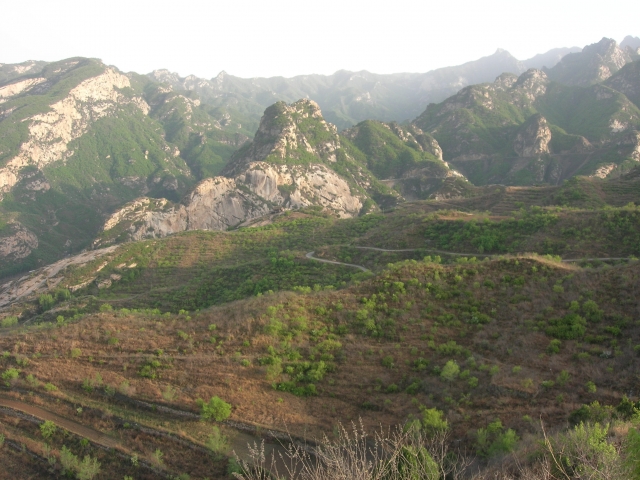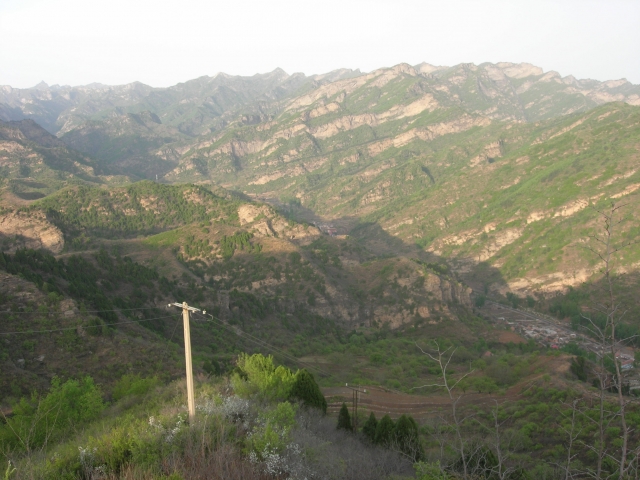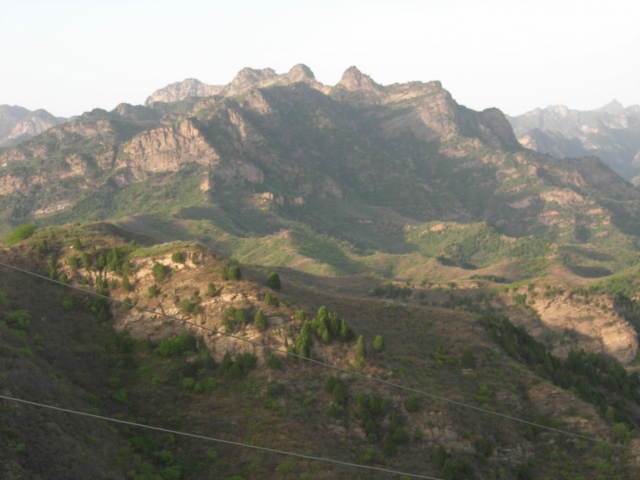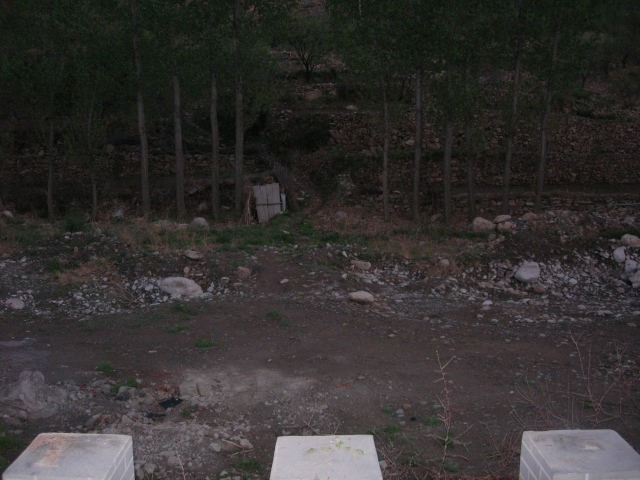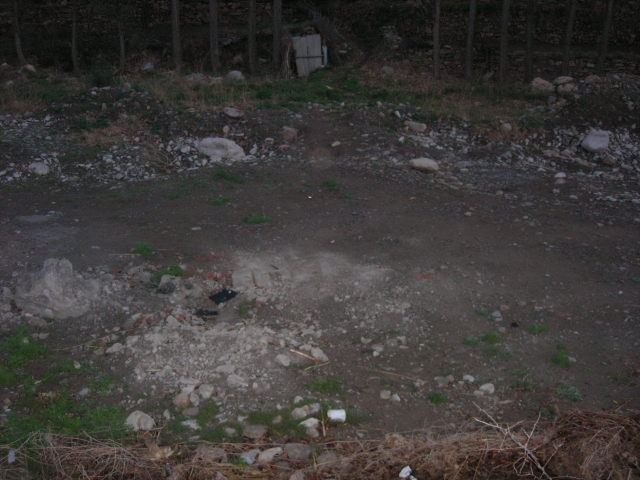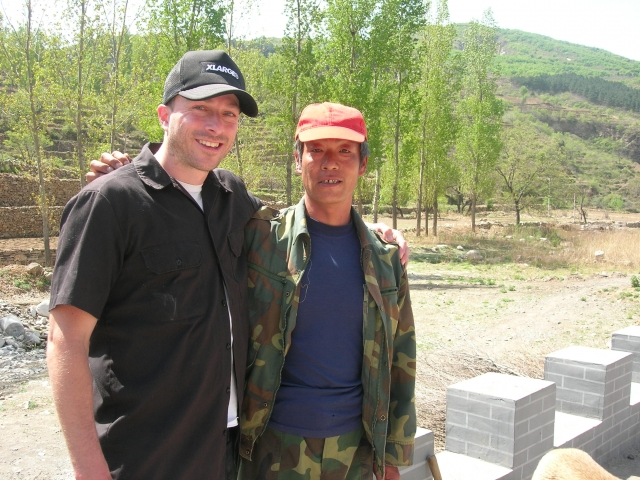From the Open-Publishing Calendar
From the Open-Publishing Newswire
Indybay Feature
May Day With the Chinese Working Class
On International Workers’ Day, 2009, after living in Beijing for five months without leaving the city, I finally made it into the country. I traveled with a British national and three Chinese folks to a small village about four hours northeast of Beijing, called Hong Xing Cun, or Red Star.
Many questions I had about socialism, Maoism, capitalism, global warming, independence from the government, and the working class in China were answered to a much greater degree in my mind.
We hiked through a valley along the edge of a river for several hours before arriving at a village that had been in this valley long since before World War II. Perhaps it had even been there for a thousand years. Who knows?
During our stay, it became apparent this place had survived both social and geological upheaval over time. In spite of it all, the descendants of past people living on this land are still there, still engaging in the same socialist agricultural lifestyle—with a few exceptions like solar power and cell phones.
The story begins when we wander into a village of no more than 100 people after hiking in the heat and humidity for almost twenty kilometers. We were hot, tired, and hungry. Through the translations of our bilingual Chinese friends, we were able to learn that one house in the village provides accommodations for travelers, such as a room to sleep in, food, a shower, etc.
Almost immediately, we began friendly exchanges about politics, history, and the local culture. Many of these exchanges were with an old farmer who would impart much knowledge before we left his little valley.
Amenities
Our living necessities were provided by a family of three with one 15-year-old daughter who was home from school due to the May 1st holiday. Her parents were very kind and welcoming. As a Bay Area vegan, it was an unusual experience for me when the mother nonchalantly took a chicken out of the chicken coop and chopped off its head right in front of us. Few meat-eaters in the U.S. or elsewhere have that kind of exposure to where their food comes from. One thing is for sure, these chickens were living better than any I’ve seen at the factory farms in the U.S. These folks clearly have a stronger understanding of, and connection to, the source of their food. We were also served homemade tofu, and fresh organic vegetables prepared with spices and seasoning I’ve never had before, as well as some I have tried.
For bathing, there was a shower in the bathroom, which was a small brick and cement room with a traditional toilet that one squats over. The shower water came from a hot water tank on the roof of the house which is connected to a solar panel that generates the electricity to heat the shower water all day. By the evening the water is scalding hot. The toilet is flushed by dumping the rinse water used to wash one’s hands into the toilet and down a drain. This was the most efficient use of water for a flushing toilet that I have ever seen. Water conservationists call this using the “grey water.” Toilet paper is placed in a trash can and disposed of with the rest of the garbage. All the water, whether for the toilet, washing one’s hands, doing the dishes, or drinking comes from a nearby spring.
Speaking of the spring, it is located in a dry river bed that used to be a flowing river that went alongside the houses in the village, which are all in a row on the riverbank. An old man told us it just dried up over the years, but the villagers used to pull huge fish out of it and the former river was a big source of food for them when he was a young man. This report is consistent with studies conducted on the effect of global warming on China’s waterways, as covered in Al Gore’s documentary, An Inconvenient Truth. One question that came to my mind was: what happens when the spring dries up? Where do they get their water? There was water elsewhere in the valley, but the villagers would have to go further and further to get it over time if the local water supply continues on the established trajectory.
Housing in the village was simple, but sturdy, spacious, and clean. The father of the family providing for us said the government built his house for free because he only has three members in his family, but those with more than three people had to pay about RMB 30,000. Which is still a really good deal for housing of this size and quality. The solar panels on the roof, hot water tank, and new bathroom were also provided by the government, along with a monthly stipend of a few hundred Yuan.
In summary, it’s not fancy, but strong, clean, and fully equipped to allow for a dignified existence. Moreover, the solar power eliminates any need for environmentally invasive power lines, as well as dependence on a private or state-owned power company. Although thousands of uprisings have been reported around China by the New York Times, it is fathomable that providing some basic necessities of life for the farmers often functions as an efficient way to quell unrest in China. Other than being provided with the above mentioned assistance, the people in this village don't have much contact with the government. (There is a police station nearby, but it seemed to be unoccupied.)
Everyone in the village shared in the labor of maintaining the vast vegetable gardens growing in terraced patches throughout the valley ascending up the steep inclines on either side of the dry riverbed. Irrigation water was transported with all terrain vehicles, or four-wheelers, and distributed in the gardens. All generations of every family could be seen tending the vegetables daily, from the children up to the grandparents. At the end of they day, meals were prepared in the households consisting of the food grown by their own hands. I saw no large cattle on this farm land, such as cows, pigs, or horses, although there were donkeys for plowing the fields, and a herd of goats.
As night fell, we hung out in front of the house and chatted with other folks who came by to say hello, and satisfy their curiosity about the two foreigners in their quiet valley. Talk turned to the subject of politics and history. An old man who was a boy when the Japanese army had occupied the valley told us of how the current Chinese president doesn’t impress him in the least, and that he considers himself a Maoist. He said he hoped that the masses of the world would someday realize the value of socialism and make it the universal norm. Although he said he doesn’t approve of China’s current government, he was proud that China is not engaging in wars of imperialism around the world like the U.S. The old farmer added that Mao would not have tolerated the U.S. bombing of the Chinese embassy in Belgrade in May 1999, and would have responded to the bombing with equal force on a U.S. target of equal political relevance, such as a U.S. embassy.
Another man of the WWII generation who joined the conversation said he missed the days of Mao, because it was so much easier to mobilize labor for civil and community projects like digging a well, or building a road.
Our original acquaintance agreed, while adding that today new technologies are more accessible. I wondered if that is an improvement that couldn’t happen under communism/socialism?
Healthcare
Through the translations of my comrade, I asked about healthcare in China as it currently exists versus the way it was under Mao. He told me a story of a friend of his from the same generation. A few years ago this man needed surgery to save his life, and the doctor wouldn’t provide it because under the current capitalist healthcare system, the services only go to those with the money to pay, and the cost was greater than the family’s life savings. Insurance was also not affordable for them. He described a scene in which the children of his friend got on their knees to beg the doctor to perform the surgery with tears running down their faces in shame and desperation.
According to this old man, healthcare wasn’t like that under Mao, who he said established a socialized healthcare system designed specifically to provide for those in the rural areas of China. Under that system farmers were trained as doctors and facilities were built in the countryside for the usual types of treatment commonly required for most agriculturally related illnesses and injuries. Our new friend then informed us that he himself had been trained as a doctor within this program, and he still provides for most of his community’s basic medical needs, using a combination of traditional Chinese medicine and western medical techniques.
Throughout our conversation with this grandfather/farmer/doctor, I noticed an elderly woman of similar age inching closer to us with an interested, enthusiastic look on her shining, weathered face. She was clearly interested in the conversation. My comrade spoke to her and she said she was the wife of this man we had been talking to. After conversing with him awhile longer with her listening enthusiastically, we asked her about how the revolution affected women in China. Providing more context, she said that women were treated like dogs before the reign of Mao—and the revolution changed all that. Suddenly they could choose which man they would marry, or whether they would marry at all. Gender roles were challenged and they found themselves participating in the leadership of their communities more.
History
Folks of the older generation also shared with us what it was like to be living in this village as a child or youth when the Japanese army was occupying it during WWII. They told us that no one was allowed to leave the valley and if the soldiers caught anyone doing so they would be killed. We were shown a location at the northern end of the valley, and told it was mass grave where hundreds of Chinese bodies had been buried after being killed in various ways by the Japanese. It was the only flat ground I saw that didn’t have vegetables growing. I couldn’t help thinking this is what happens when soldiers obey the commands of an imperialist government—just like the U.S. soldiers in Iraq and Afghanistan are doing right now.
Imperialism through Tourism
On our second day in the valley, we were sitting out in the sun after some rain had kept us under the roof of the porch for the day before clearing off. A caravan of several SUV’s rolled into the village rather aggressively, driving too fast for the narrow roads and definitely not in keeping with the local ways.
Apparently, they were part of the new Beijing upper class—the small minority actually being enriched by globalization and neo-liberal capitalism—and proud of it. They just came in there like they owned the place because they had money. After narrowly missing a dog, the neuvo-riche drivers lurched to a halt, and got out of their four-wheeled status –symbols. They spoke rudely to the farmers as if the dirt on their hands made them less worthy of respect. These people were walking products of China’s growing inequality. Having gratified their egos with bravado in the face of the farmers, they got back in their vehicles and tried to do some mud-bogging down a tractor path used by the locals for transporting water and gravel. They were stopped, however, by an old man who blocked the road with his tractor. When the entitlement junkies told him to move it, he told them they had to pay an exorbitant amount of money for that service. Those in the caravan were outraged, and the SUVs abruptly did five-point turns before zooming through the singular, narrow one lane road going through the village. One of them stopped to make a failed attempt at spinning the tires and kicking up dirt and rocks towards the proletariats who had offended them. The traction was too good on the expensive new tires so the driver only succeeded in giving his female passenger whiplash as the SUV jolted forward and snapped her head back. The all-terrain tires gripped the earth too well to produce the spinning effect that throws rocks and dirt back at anything behind the vehicle. The farmers just looked at this display with a calm, unyielding countenance.
Two days later, about nine folks of European and American dissent arrived in the village as we were hiking around with the father of the household providing for us. We had been walking along the river about half a kilometer away from the village, learning from his wisdom of the local ecology and exploring around some interesting rock formations created by the erosion of the river. This guy really seemed to appreciate our interest in the things he had to share about this valley he calls home. When the entourage of twenty-something westerners hiked in up the river, they showed no appreciation for these things and started giving orders with the same sense of entitlement I observed in the SUV caravan. They showed no regard for the lives unfolding in the valley, and only wanted to be provided with services. As they threw around their money while demanding food and beer, they made no attempts to connect with the farmers. But “country” doesn’t mean “stupid.” And these country folk have ways of equalizing things a little, like charging these people three times more money than they charged us for services rendered--imperialism through tourism meets resistance through many different means.
We hiked through a valley along the edge of a river for several hours before arriving at a village that had been in this valley long since before World War II. Perhaps it had even been there for a thousand years. Who knows?
During our stay, it became apparent this place had survived both social and geological upheaval over time. In spite of it all, the descendants of past people living on this land are still there, still engaging in the same socialist agricultural lifestyle—with a few exceptions like solar power and cell phones.
The story begins when we wander into a village of no more than 100 people after hiking in the heat and humidity for almost twenty kilometers. We were hot, tired, and hungry. Through the translations of our bilingual Chinese friends, we were able to learn that one house in the village provides accommodations for travelers, such as a room to sleep in, food, a shower, etc.
Almost immediately, we began friendly exchanges about politics, history, and the local culture. Many of these exchanges were with an old farmer who would impart much knowledge before we left his little valley.
Amenities
Our living necessities were provided by a family of three with one 15-year-old daughter who was home from school due to the May 1st holiday. Her parents were very kind and welcoming. As a Bay Area vegan, it was an unusual experience for me when the mother nonchalantly took a chicken out of the chicken coop and chopped off its head right in front of us. Few meat-eaters in the U.S. or elsewhere have that kind of exposure to where their food comes from. One thing is for sure, these chickens were living better than any I’ve seen at the factory farms in the U.S. These folks clearly have a stronger understanding of, and connection to, the source of their food. We were also served homemade tofu, and fresh organic vegetables prepared with spices and seasoning I’ve never had before, as well as some I have tried.
For bathing, there was a shower in the bathroom, which was a small brick and cement room with a traditional toilet that one squats over. The shower water came from a hot water tank on the roof of the house which is connected to a solar panel that generates the electricity to heat the shower water all day. By the evening the water is scalding hot. The toilet is flushed by dumping the rinse water used to wash one’s hands into the toilet and down a drain. This was the most efficient use of water for a flushing toilet that I have ever seen. Water conservationists call this using the “grey water.” Toilet paper is placed in a trash can and disposed of with the rest of the garbage. All the water, whether for the toilet, washing one’s hands, doing the dishes, or drinking comes from a nearby spring.
Speaking of the spring, it is located in a dry river bed that used to be a flowing river that went alongside the houses in the village, which are all in a row on the riverbank. An old man told us it just dried up over the years, but the villagers used to pull huge fish out of it and the former river was a big source of food for them when he was a young man. This report is consistent with studies conducted on the effect of global warming on China’s waterways, as covered in Al Gore’s documentary, An Inconvenient Truth. One question that came to my mind was: what happens when the spring dries up? Where do they get their water? There was water elsewhere in the valley, but the villagers would have to go further and further to get it over time if the local water supply continues on the established trajectory.
Housing in the village was simple, but sturdy, spacious, and clean. The father of the family providing for us said the government built his house for free because he only has three members in his family, but those with more than three people had to pay about RMB 30,000. Which is still a really good deal for housing of this size and quality. The solar panels on the roof, hot water tank, and new bathroom were also provided by the government, along with a monthly stipend of a few hundred Yuan.
In summary, it’s not fancy, but strong, clean, and fully equipped to allow for a dignified existence. Moreover, the solar power eliminates any need for environmentally invasive power lines, as well as dependence on a private or state-owned power company. Although thousands of uprisings have been reported around China by the New York Times, it is fathomable that providing some basic necessities of life for the farmers often functions as an efficient way to quell unrest in China. Other than being provided with the above mentioned assistance, the people in this village don't have much contact with the government. (There is a police station nearby, but it seemed to be unoccupied.)
Everyone in the village shared in the labor of maintaining the vast vegetable gardens growing in terraced patches throughout the valley ascending up the steep inclines on either side of the dry riverbed. Irrigation water was transported with all terrain vehicles, or four-wheelers, and distributed in the gardens. All generations of every family could be seen tending the vegetables daily, from the children up to the grandparents. At the end of they day, meals were prepared in the households consisting of the food grown by their own hands. I saw no large cattle on this farm land, such as cows, pigs, or horses, although there were donkeys for plowing the fields, and a herd of goats.
As night fell, we hung out in front of the house and chatted with other folks who came by to say hello, and satisfy their curiosity about the two foreigners in their quiet valley. Talk turned to the subject of politics and history. An old man who was a boy when the Japanese army had occupied the valley told us of how the current Chinese president doesn’t impress him in the least, and that he considers himself a Maoist. He said he hoped that the masses of the world would someday realize the value of socialism and make it the universal norm. Although he said he doesn’t approve of China’s current government, he was proud that China is not engaging in wars of imperialism around the world like the U.S. The old farmer added that Mao would not have tolerated the U.S. bombing of the Chinese embassy in Belgrade in May 1999, and would have responded to the bombing with equal force on a U.S. target of equal political relevance, such as a U.S. embassy.
Another man of the WWII generation who joined the conversation said he missed the days of Mao, because it was so much easier to mobilize labor for civil and community projects like digging a well, or building a road.
Our original acquaintance agreed, while adding that today new technologies are more accessible. I wondered if that is an improvement that couldn’t happen under communism/socialism?
Healthcare
Through the translations of my comrade, I asked about healthcare in China as it currently exists versus the way it was under Mao. He told me a story of a friend of his from the same generation. A few years ago this man needed surgery to save his life, and the doctor wouldn’t provide it because under the current capitalist healthcare system, the services only go to those with the money to pay, and the cost was greater than the family’s life savings. Insurance was also not affordable for them. He described a scene in which the children of his friend got on their knees to beg the doctor to perform the surgery with tears running down their faces in shame and desperation.
According to this old man, healthcare wasn’t like that under Mao, who he said established a socialized healthcare system designed specifically to provide for those in the rural areas of China. Under that system farmers were trained as doctors and facilities were built in the countryside for the usual types of treatment commonly required for most agriculturally related illnesses and injuries. Our new friend then informed us that he himself had been trained as a doctor within this program, and he still provides for most of his community’s basic medical needs, using a combination of traditional Chinese medicine and western medical techniques.
Throughout our conversation with this grandfather/farmer/doctor, I noticed an elderly woman of similar age inching closer to us with an interested, enthusiastic look on her shining, weathered face. She was clearly interested in the conversation. My comrade spoke to her and she said she was the wife of this man we had been talking to. After conversing with him awhile longer with her listening enthusiastically, we asked her about how the revolution affected women in China. Providing more context, she said that women were treated like dogs before the reign of Mao—and the revolution changed all that. Suddenly they could choose which man they would marry, or whether they would marry at all. Gender roles were challenged and they found themselves participating in the leadership of their communities more.
History
Folks of the older generation also shared with us what it was like to be living in this village as a child or youth when the Japanese army was occupying it during WWII. They told us that no one was allowed to leave the valley and if the soldiers caught anyone doing so they would be killed. We were shown a location at the northern end of the valley, and told it was mass grave where hundreds of Chinese bodies had been buried after being killed in various ways by the Japanese. It was the only flat ground I saw that didn’t have vegetables growing. I couldn’t help thinking this is what happens when soldiers obey the commands of an imperialist government—just like the U.S. soldiers in Iraq and Afghanistan are doing right now.
Imperialism through Tourism
On our second day in the valley, we were sitting out in the sun after some rain had kept us under the roof of the porch for the day before clearing off. A caravan of several SUV’s rolled into the village rather aggressively, driving too fast for the narrow roads and definitely not in keeping with the local ways.
Apparently, they were part of the new Beijing upper class—the small minority actually being enriched by globalization and neo-liberal capitalism—and proud of it. They just came in there like they owned the place because they had money. After narrowly missing a dog, the neuvo-riche drivers lurched to a halt, and got out of their four-wheeled status –symbols. They spoke rudely to the farmers as if the dirt on their hands made them less worthy of respect. These people were walking products of China’s growing inequality. Having gratified their egos with bravado in the face of the farmers, they got back in their vehicles and tried to do some mud-bogging down a tractor path used by the locals for transporting water and gravel. They were stopped, however, by an old man who blocked the road with his tractor. When the entitlement junkies told him to move it, he told them they had to pay an exorbitant amount of money for that service. Those in the caravan were outraged, and the SUVs abruptly did five-point turns before zooming through the singular, narrow one lane road going through the village. One of them stopped to make a failed attempt at spinning the tires and kicking up dirt and rocks towards the proletariats who had offended them. The traction was too good on the expensive new tires so the driver only succeeded in giving his female passenger whiplash as the SUV jolted forward and snapped her head back. The all-terrain tires gripped the earth too well to produce the spinning effect that throws rocks and dirt back at anything behind the vehicle. The farmers just looked at this display with a calm, unyielding countenance.
Two days later, about nine folks of European and American dissent arrived in the village as we were hiking around with the father of the household providing for us. We had been walking along the river about half a kilometer away from the village, learning from his wisdom of the local ecology and exploring around some interesting rock formations created by the erosion of the river. This guy really seemed to appreciate our interest in the things he had to share about this valley he calls home. When the entourage of twenty-something westerners hiked in up the river, they showed no appreciation for these things and started giving orders with the same sense of entitlement I observed in the SUV caravan. They showed no regard for the lives unfolding in the valley, and only wanted to be provided with services. As they threw around their money while demanding food and beer, they made no attempts to connect with the farmers. But “country” doesn’t mean “stupid.” And these country folk have ways of equalizing things a little, like charging these people three times more money than they charged us for services rendered--imperialism through tourism meets resistance through many different means.
Add Your Comments
We are 100% volunteer and depend on your participation to sustain our efforts!
Get Involved
If you'd like to help with maintaining or developing the website, contact us.
Publish
Publish your stories and upcoming events on Indybay.
Topics
More
Search Indybay's Archives
Advanced Search
►
▼
IMC Network


